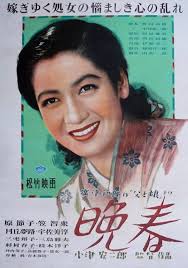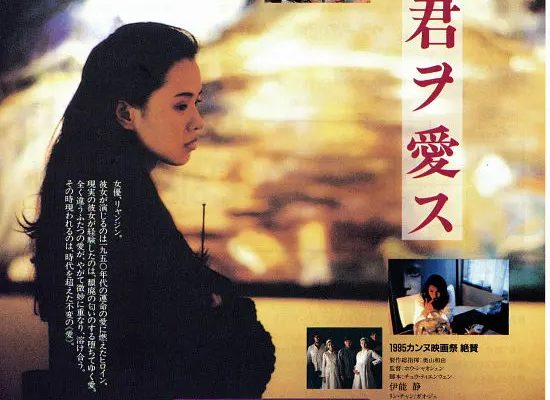
As a melodrama, Late Spring is supposed to make moral principles legible in a secular world, where the traditional patterns of moral order no longer provide the necessary social glue. However, at least three scenes in the films disturb the melodrama theme and put the morality of this film in danger: in the Noh drama scene, Noriko becomes jealous when she realized that her position in the family is substitutable; in the last night of their trip in Kyoto, Noriko lies down with her father like a married couple; after the wedding ceremony, Noriko’s friend Aya was drinking with Somiya and promises to pay him frequent visits. The suggestive display of the relation between characters makes the audience uncomfortable and suspicious. But Oedipus or Electra complex doesn’t seem to explain the problem: Noriko’s intention of using father as an excuse to void marriage equals, if not transcends, Noriko’s affection to her father. Noriko likes the man aunt Masa introduces to her, but after travelling with father to Kyoto, she wanted to stay with her father because she wanted to keep the same lifestyle. Aside from the refusal of marriage, Noriko refuse the idea of the digamy too. She thinks Jo’s remarriage as being indecent and filthy and gets angry when hearing her father’s idea of remarrying. But her thoughts about the marital problem is in constant change, she regrets about her own thoughts after meeting Jo’s wife and decides to marry out in the end.
At the ending part of the film, when Somiya persuaded Noriko to marry the man and create happiness together, she accepted and said that “I was being selfish” as if marriage is an altruist action to take. The Enlightenment philosopher Locke reiterates that a parent’s power is not absolute: the father and mother have no control over their child’s property, actions, or life once they are of age. … If all political power were paternal, a child would have only an obligation to his prince, not his parents. (Locke, s86) To get married is to accept the possibility to build her own identity in the shadow of patriarchy, her thoughts about remarriage being indecent stands for her fear of mistake or failure, however, of course the exposure to marriage creates the possibility of remarriage. The functioning of the sovereignty needed the obligation to be committed and the individuals’ exposure to instability, or their exposure to the experience of modernity.
Geist concludes that Late Spring is an exception amongst Ozu’s films since it does not picture a way for “longing to escape” (Geist,118), Noriko doesn’t leave Tokyo at the end of the story like other protagonists do. Noriko attempts to find a job like Aya did when first found her father’s (fake) intention of remarrying, but she decided to get married instead of looking for a job. Eric Fromm describes one of the sentiment of modernity as the desperate fear of freedom.(Berman, intro)Is the marriage of Noriko another form of escaping, which is her escaping from her freedom?
[1]The duality of modernity of both being harmonic and dissonant makes it hard to tell which way is the right way to live, and moral education of the melodrama is complicated in background of modernity.
About Other or self:
The Japanese film studies have become sub-discipline which includes different critical approaches that coexist without any interference. Yoshimoto thinks that it is problematic because the critics of Japanese film are mostly “neo-colonial anti-colonialism”, which emphasize the otherness in the colonial narrative (Yoshimoto,35-38)
In my opinion, the mechanic of criticism are chains of hermeneutics. However, different approaches coexist without interference would be problematic because the illusion about this sub-discipline will always be there. Antagonism is not necessary, but if we can create an certain agonist relation where others are not seen as enemies to be destroyed, but adversaries whose idea might fight (Mouffe,7), it would be helpful to break the illusion and emancipate film studies from the constant misrepresentation of the other.
Berman, M. All That Is Solid Melts Into Air: The Experience of Modernity. Verso, 1983.
Geist.k. Ozu and the Nation 114-128. Theorising National Cinema. Bloomsbury Academic, 2008.
Locke, J. Second Treatise of Government. Barnes & Noble Books, 2004.
Mouffe, C. Agonistics: Thinking the World Politically. Verso, 2013.
Yoshimoto,M.The
difficulty of being radical 27-40. Asian Cinemas: A Reader And Guide.
University of Hawai’i Press, 2006.
[1] Modernity is the readiness to turn on itself, to quest or negate all it has said, to transform itself into great range of harmonic or dissonant voice, or to stretch itself beyond its capacity into an endless wider range, to express and grasp a world where everything is pregnant with its contrary and “all that is solid melts into air”.(Berman, intro)




